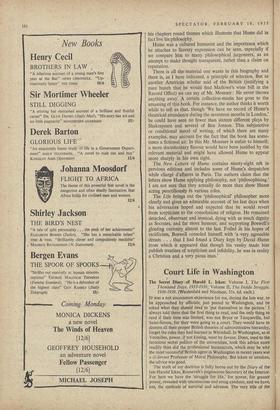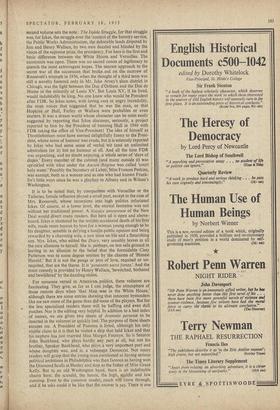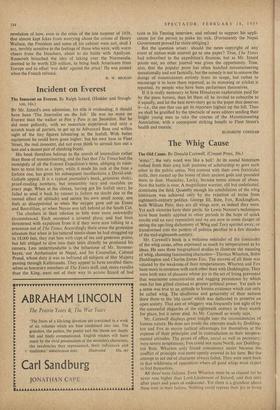Court Life in Washington
The Secret Diary of Harold L. Ickes: Volume 1, The First Thousand Days, 1933-1936; Volume II, l'he Inside Struggle, 1936-1939. (Weidenfeld and Nicolson, 31s. 6d. each.) IT was a not uncommon experience for me, during the late war, to be approached by officials, just posted to Washington, and be asked what they should read to 'put themselves in the picture.' I always told them that the first thing to read, and the only thing to read if their time was limited, was not Bryce or Tocqueville, but Saint-Simon, for they were going to a court. They would have to dismiss all their proper British theories of administrative hierarchy, forget the rules they had learned in Whitehall. In Washington, as at Versailles, power, if not kissing, went by favour. Dons, used to the ferocious secret politics of the universities, took this advice more readily than did the professional bureaucrats, which may be why the most successful British agent in Washington in recent years was a el-de-mit Professor of Moral Philosophy. But taken or untaken, the advice was good.
The truth of my doctrine is fully borne out by the Diary of the late Harold Ickes, Roosevelt's pugnacious Secretary bf the Interior. For here we have the 'struggle for life,' for power, for greater power, revealed with unconscious and smug candour, and we have, too, the methods of survival and advance. The' very title of the second volume sets the note : The Inside Struggle, for that struggle was, for Ickes, the struggle over the control of the forestry service, the Public Works Administration, the debatable lands disputed by him and Henry Wallace, by two men dazzled and blinded by the vision of the supreme prize, the presidency. For here is the first and basic difference between the White House and Versailles. The succession was open. There was no sacred canon of legitimacy to quench the most extravagant hopes. The nearest approach to the secret war of the succession that broke out on the morrow of Roosevelt's triumph in 1936, when the thought of a third term was still a novelty fostered only in Mr. Jake Arvey's slum district in Chicago, was the fight between the Duc d'Orlaans and the Duc de Maine in the minority of Louis XV. But Louis XV, if he lived, would indubitably be king. No one knew who would be President after FDR. So Ickes notes, with loving care or angry incredulity, the siren voices that suggested that he was the man, or that Hopkins or Hull, Farley or Wallace were probables or even starters. It was a dream world whose character can be most easily suggested by reporting that Ickes discusses, seriously, a project reported to him by the President of running Hull in 1940 with FDR taking the office of Vice-President! The idea of himself as Throttlebottorn must have seemed delightfully funny to the Presi- dent, whose sense of humour was crude, but it is solemnly reported by Ickes who had some sense of verbal wit (and an unlimited admiration for it) but no humour at all. And all the time FDR was organising, and no doubt enjoying, a whole series.of 'days of dupes.' Every member of the cabinet (and many outside it) was sprinkled with what under the A ncien Regime was called 'court holy water.' Possibly the Secretary of Labor, Miss Frances Perkins, was exempt, both as a woman, and as one who had known Frank- lin's little ways since he was a playboy in Albany and in Wilson's Washington.
It is to be noted that, by comparison with Versailles or the Tuileries, female influence played a small part, except in the case of Mrs. Roosevelt, whose incursions into high politics infuriated Ickes. Of course, at a lower level, the eternal feminine was not without her traditional power. A histoire amoureuse of the New Deal would divert many readers. But here all is open and above- board. !ekes is shattered by the terrible accidental death of his first wife, made more human by love for a woman young enough to be his daughter, sensible in defying a hostile public opinion and being rewarded by a charming wife, a new lease on life and a flourishing son. Mrs. Ickes, who edited the Diary, very sensibly leaves in all the nice allusions to herself. She is, perhaps, on less safe ground in leaving in an allusion to the belief that the formidable Cissy Patterson was to some degree smitten by the charms of 'Honest Harold.' But it is not the pangs or joys of love, requited or un- requited, that are the theme. It is 'potestatis sacra fames.' And the main comedy is provided by Henry Wallace, 'bewitched, bothered and bewildered' by the dazzling vision.
For someone versed in American politics, these volumes are fascinating. They give, as far as I can judge, the atmosphere of those remote days when 'that Man was in the White House,' although there are some entries showing that innocent bystanders like me saw more of the game than did some of the players. But for the less specialised readers there will be baffling and even dull patches. Nor is the editing very helpful. In addition to a bad index of names, we are given two sheets of dramatis persona! to be inserted in the volumes or quickly lost. The purpose of these sheets escapes me. A President of Panama is listed, although his only visible claim to it is that he visited a ship that held Ickes and that his nephew has just married Miss Margot Fonteyn. So is Senator John Bankhead, who plays hardly any part at all, but not his brother, Speaker Bankhead, who plays a very important part and whose daughter was, and is, a vehement Democrat. Not many readers will grasp that the young man mentioned as having serious political ambitions in Philadelphia was then famous as having won the Diamond Sculls at Henley and now as the father of Miss Grace Kelly. But to an old Washington hand, there is an indefinable charm here; the scandal, the booze, the high, middle and low cunning. Even to the common reader, much will come through, and if he asks could it be like that the answer is yes. There is one
revelation of how, even in the crisis of the late summer of 1939, that almost kept Ickes from worrying about the crimes of Henry Wallace, the President and some of his cabinet were not, shall I say, terribly sensitive to the feelings of those who were, with warm cheers from the bleachers, about to do battle with Apollyon. Roosevelt broached the idea of taking over the Normandie, deemed to be worth $20 million, to bring back Americans from Europe and to offset 'war debt' against the price! He was pained when the French refused.
D. W. BROGAN












































 Previous page
Previous page